Handyman services are becoming essential in today’s fast-paced world, as homeowners and businesses increasingly rely on skilled professionals for repairs, maintenance, and improvements. With people juggling busy schedules, the demand for reliable, on-call handyman services continues to grow. This business offers entrepreneurs the chance to tap into a highly scalable market with minimal upfront investment and a wide range of service possibilities, from home repairs to furniture assembly and appliance maintenance.
What makes this industry appealing is the flexibility to start small—targeting local communities—and expand as the business gains momentum. Whether it’s fixing a leaky faucet, setting up a new TV, or providing seasonal yard work, handyman services cater to everyday needs, making them indispensable for many households and businesses. With low operational costs and the opportunity to offer specialized services, the handyman industry holds immense potential for entrepreneurs ready to make their mark.
Why Choose Handyman Services Business?
Starting a handyman services business offers a unique combination of flexibility, scalability, and constant demand. As homeowners and businesses encounter routine repair and maintenance needs, they seek quick, affordable, and reliable help. This business model not only meets everyday needs but also provides entrepreneurs with the opportunity to customize their offerings based on their skills and market demand.
Handyman services cover a wide range of jobs—from plumbing fixes and painting projects to assembling furniture and installing appliances—making it easy for new business owners to find their niche. With the rise of gig economy platforms, customers now expect on-demand services at their fingertips. This trend favors small, independent service providers who can meet customer expectations without the overhead of large businesses.
Moreover, as homes and properties age, the need for repair and maintenance will only increase. Many homeowners prefer to outsource small repairs to professionals rather than tackle them on their own. This steady demand ensures a reliable income stream, especially for those who build a reputation for quality service. Additionally, handyman services require relatively low startup costs, making it an attractive option for first-time entrepreneurs. With minimal investment in tools and marketing, you can kickstart operations and expand as you grow your client base.
Starting a handyman services business offers flexibility and a steady stream of demand. From home repairs to seasonal services, these businesses cater to the evolving needs of households and businesses alike. Launching and marketing your handyman business effectively is crucial for success. Setting competitive prices, understanding market trends, and utilizing the right platforms are essential steps. With Miracuves as your technology partner, you can streamline bookings, manage operations efficiently, and reach more customers. For those looking to dive deeper into launching a handyman business, visit Handyman Startup for practical strategies and insights on how to get started and grow your business.
Read More “Top 10 Ideas for Plumbing Services Business Startups“
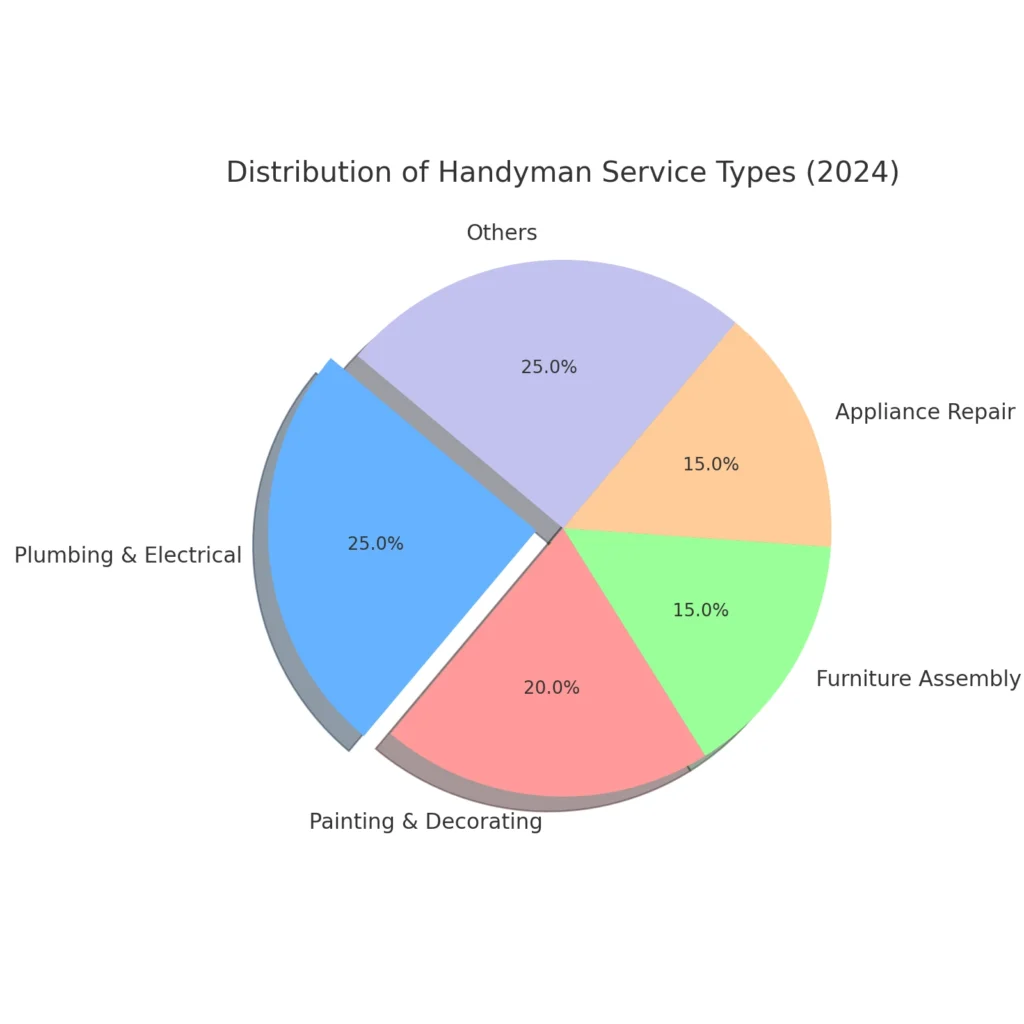
Read more : – What is Thumbtack App and How Does It Work?
Current Trends and Future Opportunities in Handyman Services
The handyman services industry is evolving, driven by both consumer expectations and technological advancements. Today’s customers want more than just repairs—they seek convenience, eco-friendliness, and speed. One growing trend is the rise of on-demand handyman apps, where customers can book services instantly. This shift aligns with modern lifestyles and offers small businesses the chance to thrive by meeting immediate needs efficiently.
Sustainable and eco-friendly services are also gaining popularity. From using low-VOC paints to offering energy-efficient appliance repairs, handyman businesses that promote sustainable practices attract environmentally-conscious customers. Offering “green” services not only helps the planet but also adds a unique selling point to the business.
Another opportunity lies in specialized services such as smart home installations. With more people adopting smart devices—like automated lighting, security systems, and thermostats—there’s a growing need for experts to install and maintain these technologies. This niche is expected to see substantial growth in the coming years.
Moreover, seasonal services are proving to be profitable. Many handyman businesses generate steady income by offering yard maintenance in summer or holiday light installations in winter. These seasonal services keep businesses active throughout the year, filling gaps between larger projects.
The combination of technology, sustainability, and specialization makes the handyman industry ripe for innovation. Entrepreneurs willing to adapt and offer creative solutions will find significant opportunities to expand and grow.
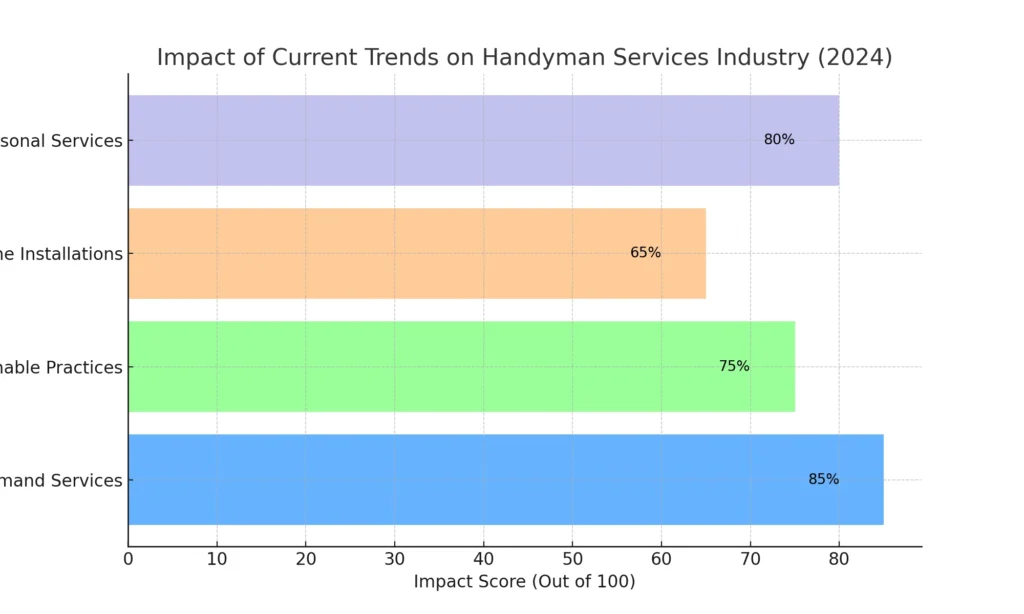
Top 10 Ideas for Handyman Services Business Startups
Here we tell about 10 ideas for handyman services, you can know and share with your family, friends and partners.
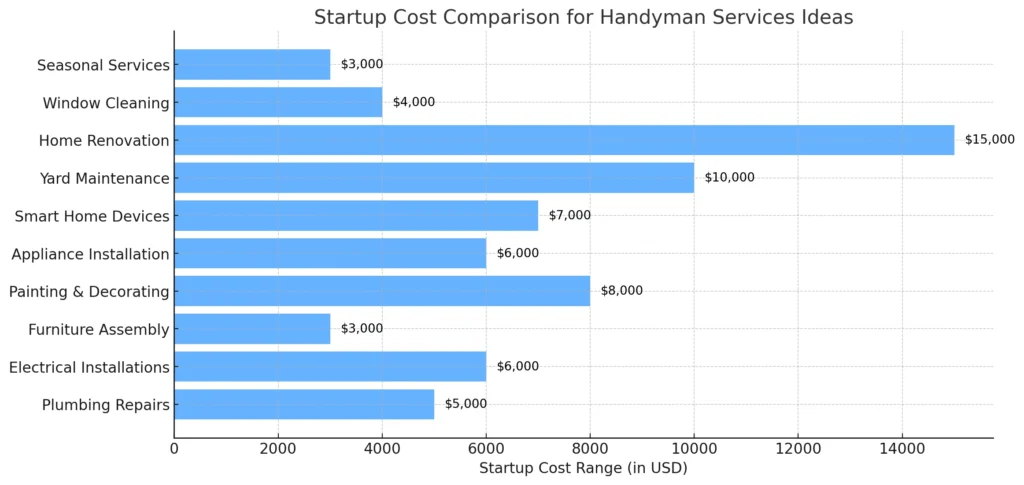
1. Plumbing Repairs and Maintenance
Specialize in handling leaks, clogged drains, and pipe installations.
- Target Market: Homeowners and businesses with plumbing needs
- Startup Cost Range: $2,000 – $5,000 (tools and marketing)
2. Electrical Installations and Repairs
Offer wiring, lighting installations, and small electrical fixes.
- Target Market: Homes, small offices, and commercial spaces
- Startup Cost Range: $3,000 – $6,000 (certifications and equipment)
3. Furniture Assembly Services
Assemble home and office furniture for clients, with same-day service.
- Target Market: Online shoppers, office movers, and new homeowners
- Startup Cost Range: $1,000 – $3,000 (basic tools and transport)
4. Painting and Decorating Services
Provide interior and exterior painting, wallpapering, and decorative services.
- Target Market: Residential and commercial properties
- Startup Cost Range: $3,000 – $8,000 (paint supplies and ladders)
5. Appliance Installation and Repair
Set up and fix appliances like washing machines and refrigerators.
- Target Market: Households and rental properties
- Startup Cost Range: $2,000 – $6,000 (spare parts and tools)
6. Smart Home Device Installation
Install smart thermostats, doorbells, and security systems.
- Target Market: Tech-savvy homeowners and small businesses
- Startup Cost Range: $2,500 – $7,000 (certification and equipment)
7. Yard Maintenance and Landscaping
Offer lawn care, trimming, and seasonal gardening services.
- Target Market: Suburban homeowners and small parks
- Startup Cost Range: $4,000 – $10,000 (landscaping tools)
8. Home Renovation and Repairs
Take on small renovations like kitchen upgrades and bathroom repairs.
- Target Market: Homeowners and real estate agents
- Startup Cost Range: $5,000 – $15,000 (materials and labor)
9. Window Cleaning and Repair Services
Provide regular window cleaning and minor repairs.
- Target Market: Homes and commercial spaces
- Startup Cost Range: $1,500 – $4,000 (cleaning supplies)
10. Seasonal Services (Holiday Decorations & Storm Prep)
Help clients with holiday lighting and seasonal home preparations.
- Target Market: Families and property managers
- Startup Cost Range: $1,000 – $3,000 (seasonal supplies)
Read more : –What is OfferUp App and How Does It Work?
Real-World Examples or Case Studies
Many handyman service businesses have thrived by addressing local needs and offering specialized services. Successful startups often begin by solving specific problems in their communities and gradually expand their offerings. For example, a business that starts with appliance repair might later offer full home maintenance services based on customer demand. These businesses build trust through reliability, fair pricing, and excellent service, which encourages word-of-mouth referrals.
Several businesses have successfully adopted seasonal services. For instance, a handyman service in a suburban area saw a surge in profits by offering holiday lighting installation during winter and lawn care during summer. By diversifying their services, they maintained steady income year-round. Another case is a startup specializing in smart home installations, capitalizing on the rise in smart security systems and energy-efficient technologies, which quickly expanded through word-of-mouth recommendations.
The secret to long-term success in this industry lies in consistency and responsiveness. Businesses that adapt to new trends—like sustainable repairs or app-based bookings—remain competitive and experience steady growth. Furthermore, maintaining strong relationships with customers ensures recurring business, creating a stable base for future expansion.
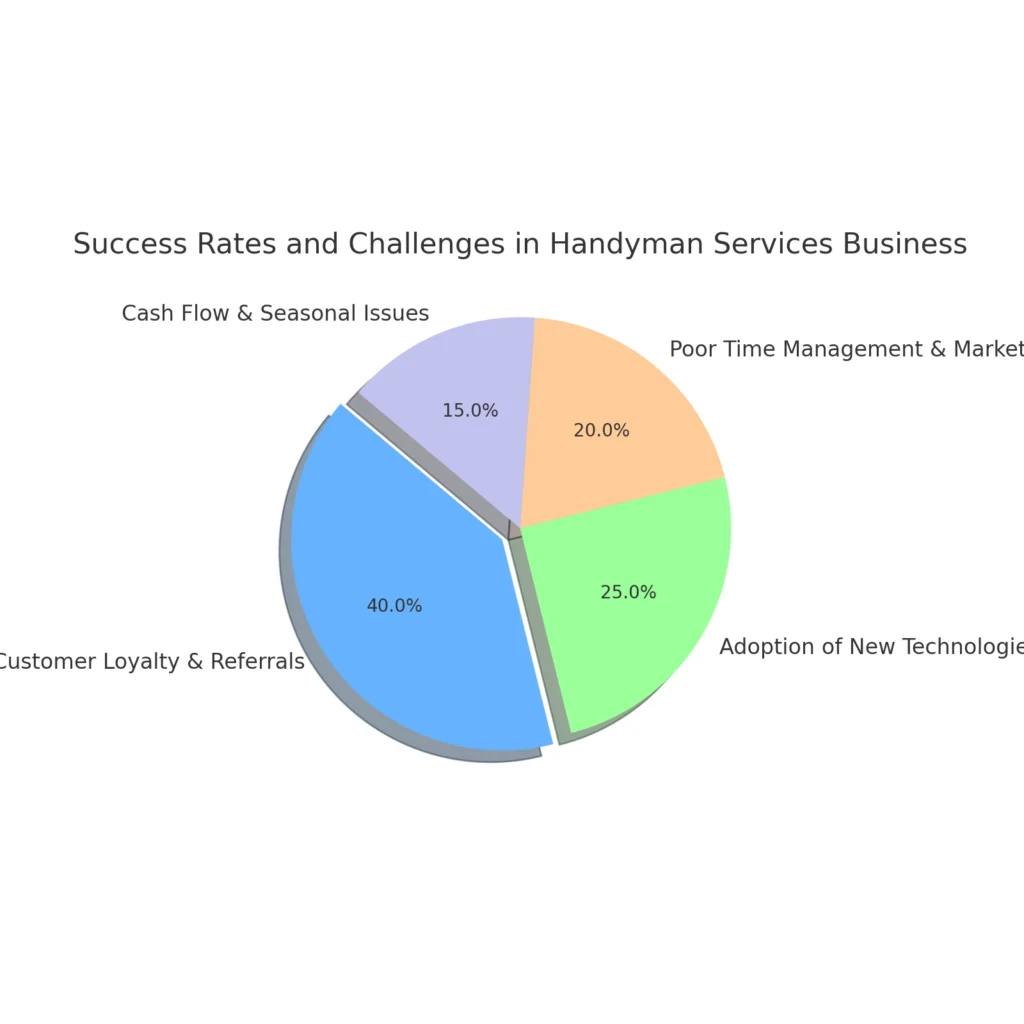
Mistakes to Avoid When Starting a Handyman Services Business
Starting a handyman services business can be exciting, but without proper planning, small mistakes can turn into costly setbacks. One of the most common errors new entrepreneurs make is poor time management. Taking on too many jobs at once without a clear schedule can lead to missed deadlines and dissatisfied customers. It’s essential to create realistic timelines for each job and communicate clearly with clients to build trust.
Another pitfall is underpricing services. Many new business owners set prices too low to attract customers, only to struggle with profitability later. It’s important to research industry rates and consider overhead costs when determining your pricing structure. Offering quality services at competitive rates ensures long-term success without burning out financially.
Neglecting marketing efforts is another mistake to avoid. Some handyman businesses rely solely on word-of-mouth referrals, missing out on opportunities to reach new customers through online platforms or local advertising. A simple website or listing on a local service directory can significantly boost visibility.
Lastly, not investing in the right tools and equipment can slow down operations and lead to unprofessional outcomes. Using outdated or inappropriate tools may result in poor workmanship, affecting the reputation of the business. Allocating a portion of the budget to essential tools ensures smoother operations and high-quality service.
Effective time management is key in the handyman industry. Many new business owners make the mistake of overcommitting or poorly scheduling jobs, leading to missed deadlines and dissatisfied clients. Utilizing service management apps can streamline scheduling and ensure smooth operations. Tools like Jobber not only help with scheduling but also assist with client management and invoicing, reducing the risk of operational errors. Explore how Jobber’s platform can support your business needs here: Jobber.
| Common Mistake | Description | Preventive Measure |
|---|---|---|
| Poor Time Management | Taking on too many jobs without planning | Use scheduling tools and plan realistic timelines |
| Underpricing Services | Charging less than industry standards | Research market rates and calculate overhead costs |
| Neglecting Marketing | Relying only on word-of-mouth referrals | Utilize online listings and social media platforms |
| Insufficient Tools & Equipment | Using outdated or incorrect tools | Invest in essential, high-quality tools |
Why Trust Miracuves Solutions for Your Next Project?
Choosing the right partner can make or break your business, and Miracuves Solutions offers everything you need to build a reliable, scalable handyman services platform. With extensive expertise in app development tailored specifically for service businesses, Miracuves ensures you stay ahead in a competitive market. Whether you need a custom app for easy customer booking or advanced tools to manage schedules and payments, Miracuves delivers it all.
What sets Miracuves apart is their unmatched speed and affordability. With a development process that is 30 times faster than industry norms, your platform will be ready in days instead of months. Even better, the cost is only 10% of what you would typically pay elsewhere—allowing you to invest more in growing your business.
Miracuves also takes pride in providing end-to-end support, ensuring that your app or platform runs smoothly from launch day onward. From backend maintenance to user-friendly design, every solution is crafted to enhance your customer experience and boost engagement. Their track record of working with service-based businesses means they understand the unique challenges of the handyman industry and provide tools to overcome them.
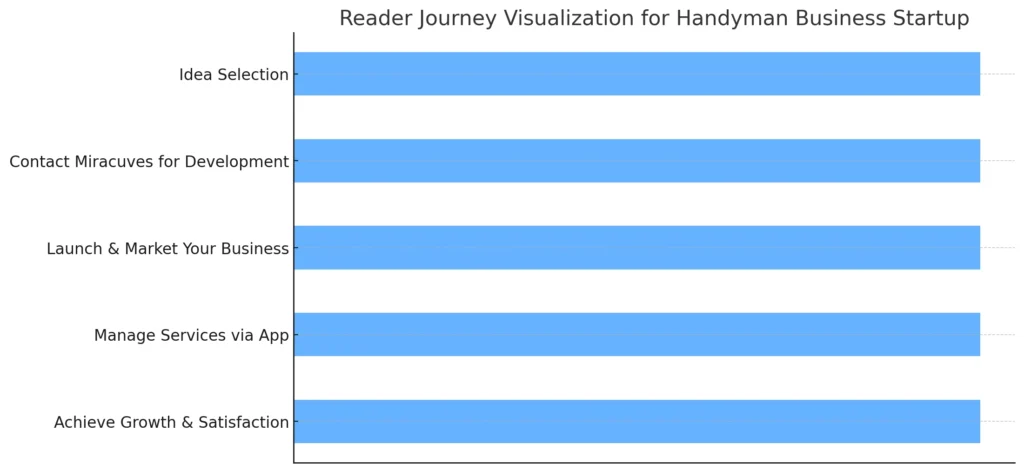
Read more : –How to Start a Home Services Marketplace Platform Business
Conclusion
Starting a handyman services business is a smart way to tap into a growing market that offers steady demand and room for innovation. Whether it’s providing essential home repairs, offering seasonal services, or installing smart devices, entrepreneurs have multiple ways to build a sustainable business. The key to success lies in smart planning, responsive customer service, and adapting to trends such as on-demand apps and eco-friendly practices.
By focusing on quality and customer satisfaction, businesses can not only retain clients but also attract new ones through positive word-of-mouth. With the right strategy, tools, and partners like Miracuves, your handyman service can thrive—bringing both personal fulfillment and financial success. This article has explored a wide range of ideas and insights to help you make informed decisions and confidently take the next step. Contact Miracuves today to start building a handyman business that stands out in the market.
FAQs
What is the best way to market a handyman services business?
Utilize a mix of online and offline marketing strategies. Build a simple website, create profiles on social media, and list your services on local business directories. Distribute flyers in your local area and offer referral discounts to grow through word-of-mouth.
What essential tools do I need to start a handyman service?
A basic toolkit should include screwdrivers, wrenches, hammers, drills, measuring tapes, and safety gear. As your business grows, you can invest in specialized tools for plumbing, electrical, or furniture assembly jobs.
How can I set competitive prices for my services?
Research local competitors and analyze market rates. Factor in your expenses, such as tools, transportation, and marketing. Offering competitive yet profitable prices will attract customers while ensuring your business remains sustainable.
Do I need insurance to run a handyman business?
Yes, having liability insurance is crucial to protect your business from unforeseen incidents or damages. Some clients may also require proof of insurance before hiring your services, enhancing your credibility.
How can I effectively manage time and multiple clients?
Use scheduling apps to organize jobs and set realistic timelines. Prioritize urgent tasks and communicate clearly with clients about timeframes. Keeping a well-structured schedule ensures efficient service delivery and satisfied customers.
Related Articles:








